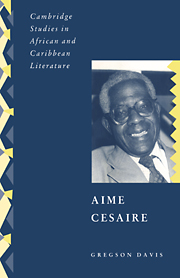Book contents
- Frontmatter
- Contents
- Preface
- Acknowledgements
- Chronology
- Introduction
- 1 From island to metropolis: the making of a poet
- 2 Exploring racial selves: “Journal of a Homecoming”
- 3 Inventing a lyric voice: the forging of “Miracle Weapons”
- 4 Lyric registers: from “Sun Cut Throat” to “Cadaster”
- 5 The turn to poetic drama
- 6 The return to lyric: “me, laminaria …”
- Epilogue
- Notes
- Bibliography
- Index
5 - The turn to poetic drama
Published online by Cambridge University Press: 29 October 2009
- Frontmatter
- Contents
- Preface
- Acknowledgements
- Chronology
- Introduction
- 1 From island to metropolis: the making of a poet
- 2 Exploring racial selves: “Journal of a Homecoming”
- 3 Inventing a lyric voice: the forging of “Miracle Weapons”
- 4 Lyric registers: from “Sun Cut Throat” to “Cadaster”
- 5 The turn to poetic drama
- 6 The return to lyric: “me, laminaria …”
- Epilogue
- Notes
- Bibliography
- Index
Summary
What is the history of the entire New World if not a chronicle of magic reality?
Alejo CarpentierThe struggle of Toussaint L'Ouverture was this struggle for the transformation of a juridic right into a real right, the struggle for the recognition of man, and that is why it both inscribes itself and inscribes [il s'inscrit et inscrit] the revolt of the black slaves of Saint Domingue in the history of world civilization.
Aimé GésaireCésaire's path to maturation, both as verbal artist and as elected politician, reached a critical dividing fork in 1956. As we have seen in regard to our earlier discussion of his famous “Letter to Maurice Thorez,” the now more experienced and self-confident deputy mayor made the crucial decision in that year to sever his formal ties with the French Communist Party and to found his own organization in his native island (the “Martinican Progressive Party”). This rupture with the central metropolitan bureaucracy converged, in the sphere of his literary production, with a turn from lyric poetry to what might be called lyric drama. It is easy to explain this shift in literary genre as motivated by the sincere desire on his part to narrow the gap in communication between avant-garde writer and provincial audience, and Césaire himself has avowed as much in published interviews. The particular form that his dramaturgy took, however, belies such a clear-cut explanation; for his very first experiment in the new genre, “And the Dogs Kept Quiet” (Et les chiens se taisaient) is composed in a style only marginally less grandiloquent and “surreal” than that of his lyric poetry up to that juncture.
- Type
- Chapter
- Information
- Aimé Césaire , pp. 126 - 162Publisher: Cambridge University PressPrint publication year: 1997

